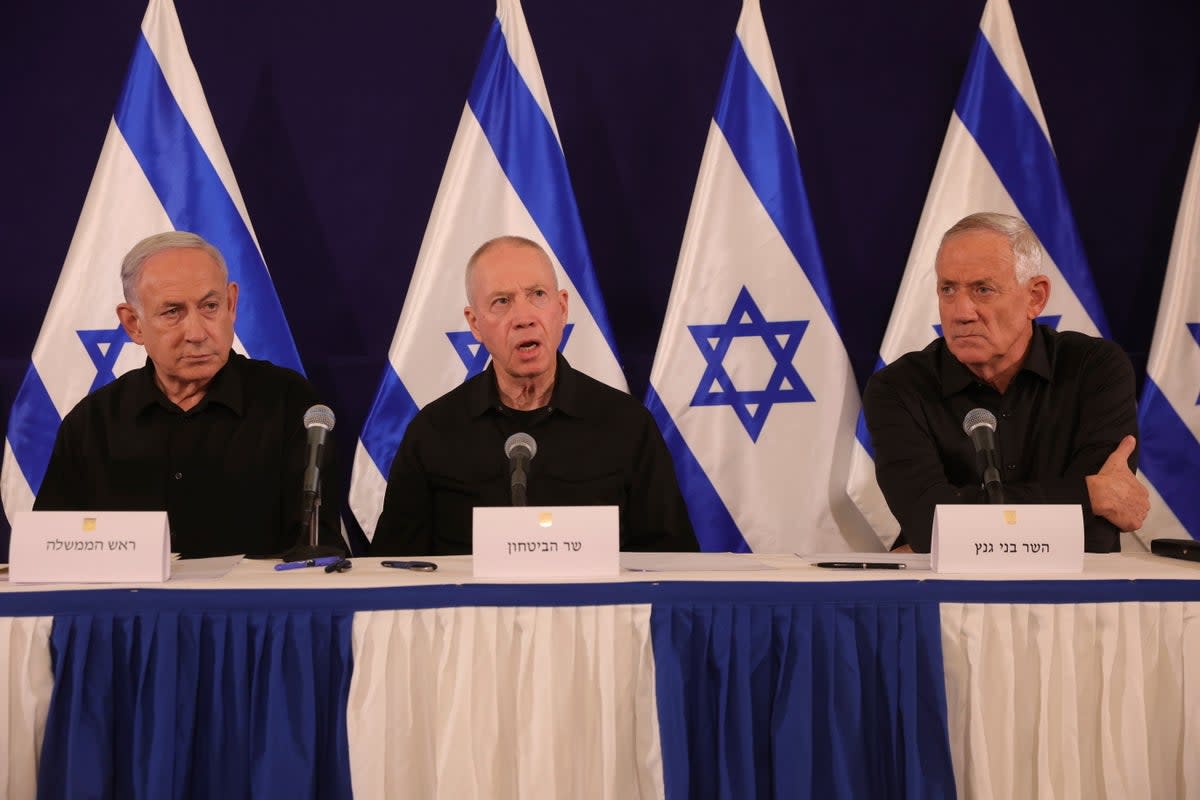Netanyahu dissolves Israeli war cabinet in wake of opposition leader having quit

Israeli prime minister Benjamin Netanyahu has dissolved the country’s war cabinet – a move that should solidify his grasp of decision-making over the war in Gaza.
It comes as discontent mounts over Israel’s conduct during the war and amid calls for a week of protests from anti-government groups. The move was triggered after the moderate opposition leader Benny Gantz quit the cabinet last week, over what he believes is a lack of strategy over the war and what comes after it.
Mr Gantz joined a national unity government with Mr Netanyahu’s hardline coalition days after the start of the war in October. He had demanded that a small cabinet be formed as a way to sideline far-right legislators in government. Immediately afterwards, far-right national security minister Itamar Ben-Gvir said he had written to Mr Netanyahu to demand that he be added to the war cabinet.
Dissolving the war cabinet allows Mr Netanyahu to avoid clashes with his coalition partners, whose calls for Israel’s military to keep pushing on in Gaza are increasingly at odds with growing international calls for a ceasefire.
The war was triggered by a Hamas attack inside Israel during which around 1,200 people were killed and 250 more were taken hostage. A little under half of those are still being held captive in Gaza. More than 37,000 Palestinians have been killed in Gaza as a result of the Israeli military’s offensive, according to the local health ministry.
The establishment of a narrow war cabinet was a core demand of Mr Gantz to join the unity government. The six-member cabinet was made up of three active members and three observers. It also included Mr Gantz’s partner Gadi Eisenkot and Aryeh Deri, head of the religious party Shas, as observers. Mr Eisenkot has also resigned from the cabinet. Both Mr Gantz and Mr Eisenkot cited Mr Netaynahu’s failure to agree a plan for Gaza beyond the current war as their reasons for leaving. The Israeli leader has declined to comment on future plans other than to reaffirm that Hamas must be completely destroyed.
Mr Netanyahu is now expected to hold consultations about the Gaza war with a small group of ministers, including defence minister Yoav Gallant, one of the three original members of the cabinet, and strategic affairs minister Ron Dermer, formerly an observer in the group. Mr Ben-Gvir will not be permitted to take part in such discussions despite his requests, according to Israeli publication Ynet.
But Haaretz reported that some of the less sensitive issues previously discussed by the war cabinet would be transferred for discussion to the 14-member security cabinet, which includes Mr Ben-Gvir and Mr Smotrich.
The move comes as Israel and Hamas are weighing up the latest proposal for a ceasefire in exchange for the release of hostages taken by Hamas during its attack. Israeli troops are still bogged down in the Gaza Strip, fighting in the southern city of Rafah and against pockets of Hamas elsewhere. And violence continues unabated between Israel and the Lebanese Hezbollah group, with an envoy from the Biden administration in the region in a bid to avert a wider war on a second front on the Israel-Lebanon border. Hezbollah and Hamas are both backed by Iran.

Both Mr Ben-Gvir and Mr Smotrich have threatened to topple Mr Netanyahu’s government should Israel move ahead with a ceasefire deal with Hamas. The latest proposal being considered is part of the Biden administration’s most concentrated push to help wind down the war. For now, progress on a deal appears to remain elusive.
Critics say Mr Netanyahu’s wartime decision-making has been influenced by his government’s ultra-nationalists and his desire to remain in power. Netanyahu denies the accusations but may be feeling more confident in light of Mr Gantz taking a hit in the polls over his decision to leave the war cabinet; Mr Netanuahu’s poll numbers have risen as a result.
Israeli military spokesperson Rear Admiral Daniel Hagari insisted that the move to dissolve the cabinet will not affect operations inside Gaza, even if the political fallout could be significant.
“Cabinet members are being changed and the method is being changed. We have the echelon, we know the chain of command. We’re working according to the chain of command. This is a democracy,” he told reporters.
Mr Ben-Gvir had criticised a decision by the military to introduce daytime “tactical pauses in military activity” near the southern Gaza city of Rafah to allow more deliveries of humanitarian aid. According to Israeli media, Mr Netanyahu told the regular Sunday meeting of the full cabinet that “in order to reach the goal of eliminating the capabilities of Hamas, [he had] made decisions that were not always acceptable to the military echelon”, but added: “We have a country with an army and not an army with a country.”
Reuters and Associated Press contributed to this report

 Yahoo News
Yahoo News 
